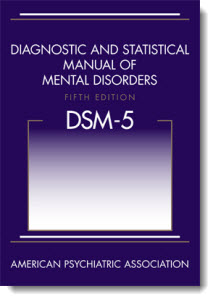The DSM-5 will take its official introductory bow at the American Psychiatric Association annual meeting in San Francisco later this month. With all of the controversy surrounding it and the utter folly of what it will include, I got to asking myself: Why do I need it? Well, the answer is I don’t and I’m not at all sure that you do either. Here’s why:
 My practice is doing just fine, and many of the new diagnostic codes – completely lacking in common sense – are worthless to me. This DSM in particular lacks any discernible value for me and most certainly does not improve my position from an assessment or diagnostic standpoint, and won’t help me with the insurance companies.
My practice is doing just fine, and many of the new diagnostic codes – completely lacking in common sense – are worthless to me. This DSM in particular lacks any discernible value for me and most certainly does not improve my position from an assessment or diagnostic standpoint, and won’t help me with the insurance companies.- Our National Institute of Mental Health doesn’t support it nor do segments of the international community for fear that it will have an amoeba-like effect on diagnosis in countries that don’t use the DSM as a diagnostic guide.
- Frankly, I’m offended by much of the new criteria inclusion. Will anybody be considered normal anymore? Are we now just a veritable culture of psychiatrically sick people? Delve into this manual enough and you’ll find something wrong with you when, in truth, you’re just fine.
- Reacting to the rhythms of life’s ups and downs illogically and irrationally from time to time doesn’t render you sick, it makes you human.
- DSM-5 field trials demonstrated poor reliabilities and the APA refused to endorse any independent review challenges. Who do these people think they are? They’re not grand, high, exalted, mystic rulers! All of us, and our work, should be subject to evaluation. If not, how are we to know what’s working and what isn’t? This is classic close-minded arrogance.
- This manual will fuel the fire for giving psychiatry a bad rap. Psychiatry can be very successful when it sticks to what it does best – assessing and treating symptom-based mental illness – not “sickifying” (word I made up) ordinarily healthy people in an inadvisable way.
- The cultural bar for meeting criteria for a psychiatric diagnosis may now be irrevocably lowered. People with bona fide psychiatric illness are already badly shortchanged due to our severely fractured mental health system. DSM-5 will be a contributor to directing scarce resources away from the very ill, and instead toward people simply mislabeled as mentally ill.
Maybe some good can come out of all of this. Perhaps the swell of concern about this DSM edition will serve as a catalyst for finally having serious, well-intentioned discussions about how to address overdiagnosis and overmedicalization. And just maybe the well-respected NIMH and CDC will launch a series of public service ads and announcements cautioning clinicians about the possible perils of diagnostic exuberance and warning parents not to willingly accept any diagnosis for which a clinician cannot provide a clear rationale.





Leave A Comment
You must be logged in to post a comment.